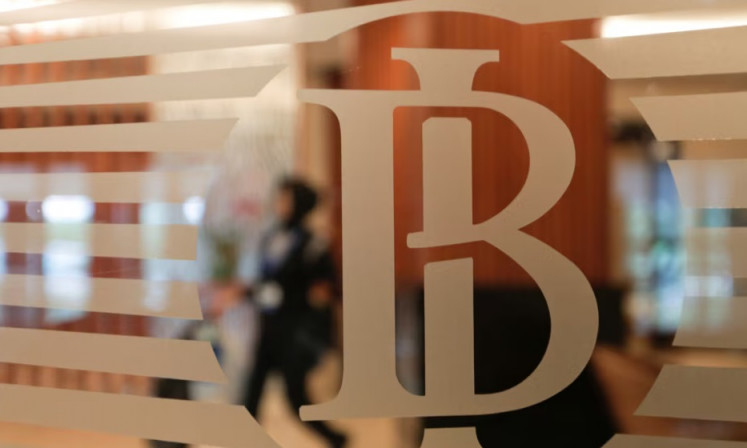Popular Reads
Top Results
Can't find what you're looking for?
View all search resultsPopular Reads
Top Results
Can't find what you're looking for?
View all search resultsGovernment paves the roads with good intentions in Papua
Bambang Darmono: JP/NurhayatiThe House of Representatives (DPR) recently set up a committee to examine the government’s policies on the resource-rich province of Papua
Change text size
Gift Premium Articles
to Anyone
Bambang Darmono: JP/Nurhayati
The House of Representatives (DPR) recently set up a committee to examine the government’s policies on the resource-rich province of Papua. Lawmakers blame the recurring violence in the province on the ineffectiveness of special unit UP4B set up by President Susilo Bambang Yudhoyono in October 2011. To get some insight on the performance of UP4B, The Jakarta Post’s Margareth S. Aritonang talked to Bambang Darmono, chief of the UP4B.
Question: Many people relate increasing violence in Papua to unequal development in the province. What do you think?
Answer: I reject such a notion. I admit there are development programs in Papua that have not properly been executed, that is why President Susilo Bambang Yudhoyono established the UP4B. The job of the UP4B is to coordinate, synchronize, facilitate, evaluate and monitor all the government’s development programs there. It is our responsibility to ensure that programs designed by central government in Jakarta fit the needs of the Papuan people. Our job is also to bring together all desks on Papua within all ministries and make sure that they all are in line with the grand design. Also, we have agents in all districts in Papua to help us connect with, and monitor, the people.
What do you do to make sure that Jakarta and Papua stay connected? How do you work to assess the needs of the locals?
We have around Rp 4 trillion [US$420 million] of funds this year. Some of the money is spent coordinating with our partners, including ministers, and we’ve allocated 75 percent for missions to Papua to monitor the area. I have visited all the districts, and I will keep visiting to keep abreast of the situation.
Through such trips, we get opinions and information from local administrations as well as from the people at large. We maintain our communication with them so that we know for example if people have an interest in cultivating coffee beans or farming groupers. Then we take their proposals to the related ministries in Jakarta to cultivate interest in the programs in Papua.
The House of Representatives Commission I [overseeing defense, foreign affairs, and information] recently criticized the UP4B for doing almost nothing since its establishment in October last year. Can you please share what you have done in Papua?
We are not obliged to tell you what we have done in Papua. We have created a website to provide updates about our programs. You can search for any information they need there. You must understand that our authority is limited. We are working with ministries like public works, education and culture, or the Health Ministry to carry out programs there, and we are ready to implement several programs this year.
For example, together with the Public Works Ministry we will improve the infrastructure. We will build roads to connect villages and districts.
We will also support community based economic projects especially in remote areas. Over and above this, we are finishing a Presidential Regulation to guarantee Papuan entrepreneurs equal access to the economy because they don’t have it yet. The regulation lets Papuans actively improve the economy of their region, which is mostly managed by outsiders for the time being.
In addition, the government has programs to provide quality education for the locals.
The Education and Culture Ministry has agreed to set aside 963 places at 32 state universities across the country for Papuan students. Around 747 students have registered. These students will undergo up to a year’s training to help teach at schools across the province due to the limited number of teachers available. The ministry has agreed to house 1,000 students. We are proposing another 1,500 students.
In terms of health, we are working on improving mobile health services and health centers for HIV/AIDS, tuberculosis, and malaria.
Overall, things are going to be much better in Papua.
What are the challenges in coordinating with other government institutions, including ministries, to carry out your programs in Papua?
I don’t find any serious problem with that. We have the Vice President as our leader so he cares of things when they get tough. The government has good intentions. We just need better communication.
What do you think about human rights violation in Papua? What can UP4B do to minimize them?
All countries commit human rights violations. I guarantee that not one single country in the world that fully promotes and upholds human rights. I think, Indonesia is relatively good in handling this issue compared to countries, like Syria.
There are problems in Papua, but I don’t focus on them. Improvements across the board are on the way. The government is committed to them. Trust me, life is getting better there. Protection and prosperity for the people comes through dialogue with all stakeholders in Papua. We are always open to dialogue on social issues in Papua. But, we will not talk about Papua’s integration into Indonesia — there is nothing else to discuss. Papua belongs to Indonesia. Those who disagree may leave the country. Period.










